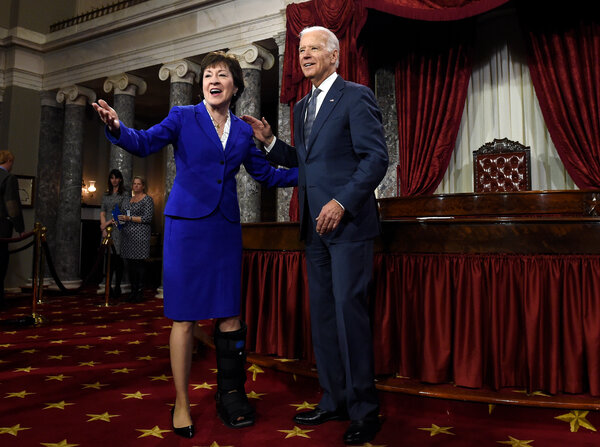
WASHINGTON — The calls began pouring in even before Senator Susan Collins, Republican of Maine, bounded onto a makeshift stage in a snowy parking lot in Bangor to declare victory in a race she was supposed to have lost.
Republicans who had privately fretted about her demise offered hearty congratulations, professing to have always known she would survive. Senator Joe Manchin III, the centrist Democrat from West Virginia, reached out wanting to know how soon he could get a meeting with his fellow moderate to begin breaking through the impasse on a coronavirus relief package. And President-elect Joseph R. Biden Jr. made a brief call to congratulate a former Senate colleague and legislative ally whose vote he will badly need to push through his agenda and staff his administration.
The ring-kissing reflected the prime perch of Ms. Collins, who, after having survived the steepest re-election challenge of her career with a comfortable margin, has emerged more powerful than ever, poised for a fifth term in which her brand of bipartisan deal-making will be crucial.
The question is how Ms. Collins, who has long held sway as one of the few swing votes in a narrowly divided Senate, will use that power. She has drawn brutal criticism in the past for courting compromise, only to ultimately side with the Republican Party line. Now with Republicans bent on blocking any policy accomplishments by a Biden administration, Ms. Collins will be under immense pressure from both sides for her pivotal vote.
“We will be able to encourage the president not to be drawn to the far left,” Ms. Collins said in an interview in Washington, calling her election and Mr. Biden’s an endorsement of divided government that vindicated her moderate approach.
“I think that’s a message the American people were sending, that they want more centrist politics pursued, and they don’t want to go to the far left, so that too provides me with an opportunity,” Ms. Collins said.
Ms. Collins, 67, has a strong relationship with Mr. Biden, who has called her “a woman of incredible character, integrity, and grace.” And now, she has the battle scars and enhanced credibility that comes with having accomplished a feat many Republicans readily concede they never could have: win a resounding victory in a state that President Trump lost. She has also surpassed a more enduring milestone, having now outlasted Margaret Chase Smith, the first woman to represent Maine in the Senate, to become the longest-serving Republican woman in the chamber’s history.
“She’s the greatest that’s ever been,” Senator Tom Cotton, Republican of Arkansas and one of the most conservative members of the Senate, declared in the aftermath, noticing Ms. Collins in conversation with a reporter in the Capitol. Senator John Cornyn, Republican of Texas, effectively declared her the queen of the Senate, posting on Instagram a depiction of Ms. Collins seated on a throne of skulls.

Her success in Maine, where she prevailed over the Democrat, Sara Gideon, despite polls showing her on track to lose, has vindicated Ms. Collins’s signature brand of New England moderation, cultivated over the last two decades. Come January, whether Mr. Biden oversees a divided government or a narrow Democratic hold on both chambers, she is positioned to play a crucial role in confirming administration nominations, approving spending agreements and negotiating legislative priorities like coronavirus relief or prescription drug legislation.
“My winning shows that a moderate can prevail in this highly polarized environment,” Ms. Collins said. “My victory in Maine shows that you can be an independent voice and take some breaths, do what you think is right, and the voters, in some states at least, will reward you.”
Ms. Collins said she was open to working with former political foes in order to achieve legislative accomplishments. But having survived a brutal campaign in which Democrats savaged her, Ms. Collins has reason to hold some grudges. She pointedly noted that Senator Chuck Schumer, Democrat of New York and the minority leader, presented “a challenge” given “the millions of dollars in blatantly false ads he ran against me.”
Though the precise balance of the power in the Senate will remain unknown until two Georgia runoff races are decided in early January, Republicans are favored to win both seats, likely leaving Mr. Biden as the first Democratic president since Grover Cleveland in 1885 to take office without Democrats in control of both congressional chambers. A fraction of Republican support — likely, that of Ms. Collins and Senator Lisa Murkowski of Alaska, who faces re-election in 2022 — will be needed to advance both his legislative and political ambitions.
“It puts her in a very strong position to get things done in the Senate,” said Steve Abbott, her campaign manager and a longtime adviser. He described “a special self-confidence that comes” from “beating the odds,” one that, he added, “strengthens her to the core, to do what she thinks is right.”
In a signal of where the power could rest in the 117th Congress, Mr. Biden has yet to speak to Senator Mitch McConnell of Kentucky, the Republican leader. But he made a point of calling Ms. Collins before his own victory was cemented. (Mr. Biden formally endorsed Ms. Gideon during the campaign, but did not appear in person with her.)
“I know we come technically from political backgrounds that are different, but they’re not that different,” Mr. Biden said in a 2017 video filmed in honor of Ms. Collins receiving an Irish Heritage Center award. “We’ve become fast and good friends, and I look forward to you continuing to lead in the United States Senate, Susan.”

“We Irish are the only ones who are nostalgic about the future,” Mr. Biden mused in the video, which the Collins campaign made a point of circulating ahead of the November election. “Well, I’m nostalgic about your future. A long way to go, and you’ve got a lot more to give.”
By no means will the Senate of 2021 resemble the courtly chamber where both Mr. Biden and Ms. Collins forged their respective careers. The civility that dominated back then has been left in tatters by partisan warfare over judicial confirmations and legislative obstruction. But the pair both steered their respective campaigns to victory based in part on their legislative prowess and the longstanding relationships they had built over decades in Washington.
Ms. Collins, who is in line to lead the powerful Appropriations Committee, ran a classic retail campaign, popping into business after business — sometimes purchasing a pair of earrings, or cans of food for a local food drive — and emphasizing the importance to Maine of her clout in the Senate.
The argument resonated for many of the voters who flocked to her flurry of campaign stops across the state, including a woman who brought a Tupperware full of the senator’s favorite cookies to a Fourth of July parade in rural Jackson, the business owners and town leaders grateful for the federal dollars she had steered their way, and the Postal Service worker who thanked her for pushing for funding for the embattled mail-delivery agency.
“There needs to be a balance,” said Liz Wisecup, a retired registered nurse, who said she voted for both Mr. Biden and Ms. Collins. Without Ms. Collins, she added, she feared that “Maine will be lost forever” in the partisan shuffle.
Ms. Collins and her allies are quick to note that her gentility and penchant for deal-making has not wavered in more than two decades, even as liberal critics have grown scornful of her seemingly perpetual pattern of condemning the extreme elements of her own party, but then siding with them on crucial votes. Her record also has plenty of notable moments of having defied the will of the Republican Party, including in declining to vote to confirm Justice Amy Coney Barrett to the Supreme Court the week before the election.

Having taken careful note of at least eight Democrats who have reached out and expressed interest in negotiating on big issues — Mr. Schumer was not among them, she noted — Ms. Collins has already begun to push for compromise.
In recent days, she has held court in the Senate basement, chastising the administration for denying Mr. Biden critical intelligence briefings and urging her colleagues to reconcile their differences on the pandemic aid measure and a funding package for the entire government.
“We work so well together,” Mr. Manchin said of Ms. Collins. “We look at the issues and we look at the problems and how we might fix them. I just can’t see losing good people like that just because they have a ‘D’ or an ‘R’ by their name.”
Luke Broadwater contributed reporting.
Did you miss our previous article...
https://trendinginthenews.com/usa-politics/bidens-plan-for-seniors-is-not-just-a-plan-for-seniors






